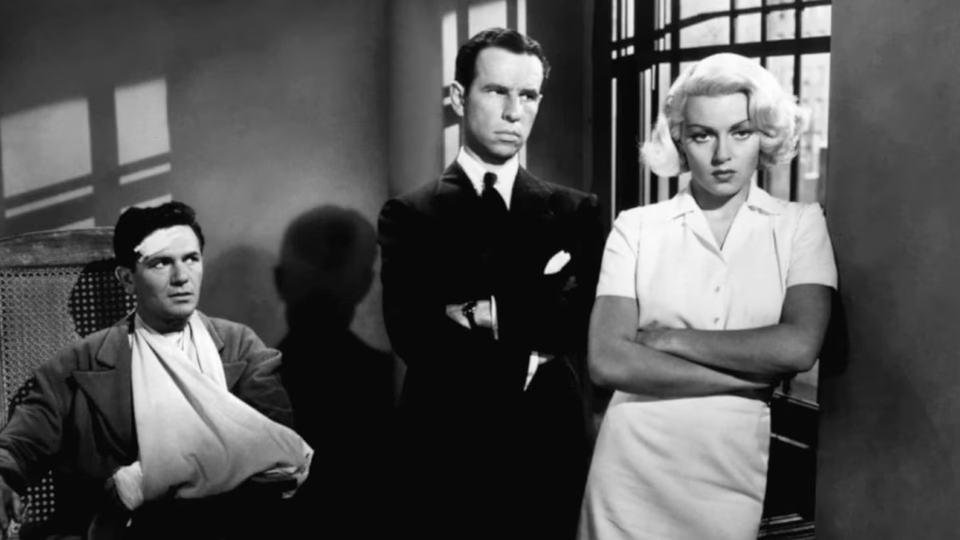The Postman Always Rings Twice

Lana Turner plays Cora, the wife of a California luncheonette owner, who lures drifter Frank, played by John Garfield, into killing her husband.
I read James M. Cain’s novel a month back and called the first two acts “some of the finest hard-boiled fiction I’ve read,” so I was eager to view this much-praised adaptation.
Despite layering the opening credits over a copy of the novel, this adaptation proves less than faithful. Consider the novel’s opening line, which speaks volumes about Frank’s character:
They threw me off the hay truck about noon.
This adaptation sees Frank dropped off at the diner wearing a sport coat and holding a suitcase. All that implied backstory gone. Some awkward exposition from a cop informs us that the fella who gave Frank a ride was the District Attorney. A tidy Hollywood screenplay, introducing characters early who figure in later, at the expense of organic plotting.
The Hollywood makeover continues inside the diner, anglicizing the owner, “The Greek” in the novel, now played by South African actor Cecil Kellaway. And Lana Turner’s Cora is a platinum bombshell with perfect hair and makeup. Compare that to her introduction in the novel:
Except for the shape, she really wasn’t any raving beauty, but she had a sulky look to her, and her lips stuck out in a way that made me want to mash them in for her.
I felt bad for Turner. She’s got the chops and tries her hardest, but can’t overcome the glamorous sheen.
As Frank, John Garfield at least brings a rugged veneer. But his character lacks agency. His golly-gee performance casts him as a sap lured in by Turner’s Cora. Compare this to his novel persona:
Next day I was alone with her for a minute, and swung my fist up against her leg so hard it nearly knocked her over.
“How do you get that way?” She was snarling like a cougar. I liked her like that.
“How are you, Cora?”
“Lousy.”
From then on, I began to smell her again.
The production code prevented showing this rampant sado masochism. Ditto Frank and Cora’s copious alcohol consumption. But rather than imply these elements, the script excises them. It paints Frank and Cora as doomed lovers.
The soap-opera production doesn’t help. Consider the awkward scene—not present in the novel—where Frank and Cora see her husband driving home drunk and Frank says, “I’d like to see him get plastered like that some night and drive off a cliff.” Cue swelling strings and horns as we cut to a closeup of Turner, who says, “You didn’t mean that. You were joking.”
On the bright side, Hume Cronyn is great as the smarmy lawyer Keats, despite the script robbing his character of the mystery and cunning he exhibits in the novel by reducing the courtroom sequence to simple melodrama.
Alan Reed also fits as Keats’s beefy assistant Kennedy. And I liked the bloodiness when Garfield roughs him up. Even if I didn’t buy Garfield’s rabbit punch jabs and slaps inflicting that degree of damage.
Another plus, this adaptation shortens the third act. In doing so, it loses the book’s bad-omen cat motif, but it’s a fair trade. That said, it also shoe-horns in an awkward monologue at the end explaining the film’s title. You win some, you lose some.
This script loses a lot. But worse than excising all the sleaze and nihilism that made the book so riveting, this adaptation adds bits that weaken it further. Like a scene where Cora’s husband reveals his plan to sell the diner and force Cora to move to northern Canada to nurse his invalid sister. Such a disappointment.
Perhaps my expectations were unrealistic. But Raymond Chandler’s adaptation of Cain’s Double Indemnity, directed by Billy Wilder two years prior, proved you could adapt Cain’s material and retain the edge.
Maybe I just shouldn’t have read the book first.